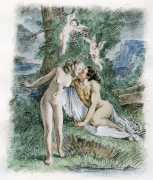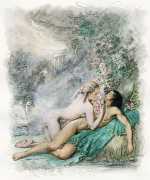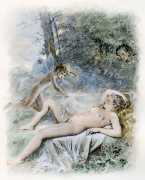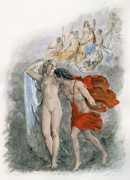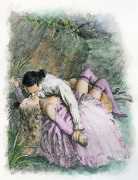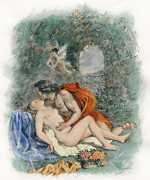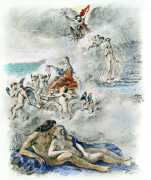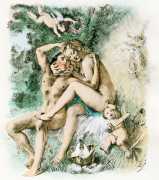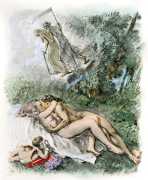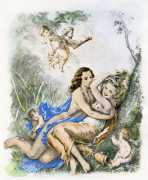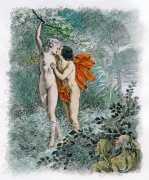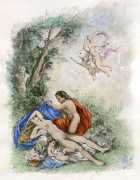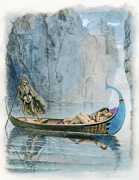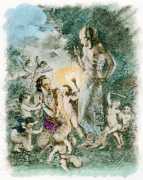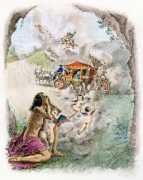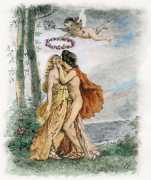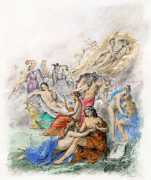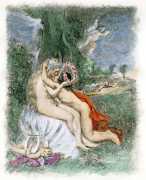 Claude Joseph Dorat (1734–80), better known as Le Chevalier Dorat, was a prolific French writer, playwright and poet, whose works include Réponse d’Abélard à Héloise (Abelard’s Answer to Heloise, 1771) and Les victimes de l’amour, ou lettres de quelques amants célébres (Victims of Love, or Letters from Famous Lovers, 1776). Les baisers, précédés du mois de Mai (Kisses, Preceded by the Month of May) was published in 1770, a charming, mildly sensuous collection of twenty poems dedicated to the joys of kissing.
Claude Joseph Dorat (1734–80), better known as Le Chevalier Dorat, was a prolific French writer, playwright and poet, whose works include Réponse d’Abélard à Héloise (Abelard’s Answer to Heloise, 1771) and Les victimes de l’amour, ou lettres de quelques amants célébres (Victims of Love, or Letters from Famous Lovers, 1776). Les baisers, précédés du mois de Mai (Kisses, Preceded by the Month of May) was published in 1770, a charming, mildly sensuous collection of twenty poems dedicated to the joys of kissing.
Besides light verse Dorat wrote comedies, fables and novels. He tried to cover his failures as a dramatist by buying up large numbers of seats for performances, and though his books were lavishly illustrated by good artists and expensively produced, they mostly failed to sell. He managed to attract the ire of both the ruling Philosophe party as well as that of their arch-enemy, Charles Palissot de Montenoy, and thus cut himself off from the possibility of academic honours.
Dorat published most of his works with numerous engravings by Clément-Pierre Marillier and Charles Eisen, which made them masterpieces of art and typographic luxury. Abbé Galiani said on this subject that the poet ‘saved himself from shipwreck plate by plate’. Thus the collection of his fables alone cost him more than thirty thousand livres for the prints by Marillier and Eisen, but despite the images the book did not sell, and if the poet’s reputation may have gained from it his fortune ended up being lost. Once he had fallen into poverty, he lived off the benefits of his mistress, Fanny de Beauharnais, for whom he partly composed the verses, spending his last years in sorrow, in dispute with the actors in his plays, in lawsuits with his booksellers, harassed by his creditors and trashed by his critics.

History has not served Dorat well. In his Correspondance littéraire, philosophique et critique (Literary, Philosophical and Critical Correspondence) the critic Friedrich Melchior Grimm wrote, ‘Monsieur Dorat perhaps does not write too many verses, but he has them printed too much.’ Regarding some of his short poems, he added, ‘It is a graceful warble, a canary’s whistle, it could not be more agreeable, but it is gone with the wind.’ Dorat never really escaped his status as a minor author, and his works ended up falling into oblivion.
Apart from two of his epistolary novels, Les sacrifices de l’amour (The Sacrifices of Love) and Les malheurs de l’inconstance (The Misfortunes of Inconstancy), which were reissued in 1983 and 1996, the only work of Dorat to survive into the twentieth century is Les baisers, here illustrated in exuberant style by Bécat.
A complete online version of the 1770 edition can be found here.
The Bécat-illustrated Dorat was published by Éditions Éryx in a limited, numbered and boxed edition of 695 copies.


